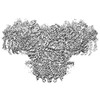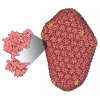+ データを開く
データを開く
- 基本情報
基本情報
| 登録情報 | データベース: PDB / ID: 7vmm | |||||||||||||||||||||
|---|---|---|---|---|---|---|---|---|---|---|---|---|---|---|---|---|---|---|---|---|---|---|
| タイトル | Structure of recombinant RyR2 (EGTA dataset, class 1, closed state) | |||||||||||||||||||||
 要素 要素 |
| |||||||||||||||||||||
 キーワード キーワード | MEMBRANE PROTEIN / CALCIUM / CALCIUM CHANNEL / CALCIUM TRANSPORT / ION TRANSPORT / IONIC CHANNEL / METAL TRANSPORT / ER/SR MEMBRANE / RYANODINE RECEPTOR / RYANODINE / RECEPTOR / WILD TYPE | |||||||||||||||||||||
| 機能・相同性 |  機能・相同性情報 機能・相同性情報manganese ion transmembrane transport / suramin binding / establishment of protein localization to endoplasmic reticulum / type B pancreatic cell apoptotic process / Purkinje myocyte to ventricular cardiac muscle cell signaling / regulation of SA node cell action potential / regulation of atrial cardiac muscle cell action potential / left ventricular cardiac muscle tissue morphogenesis / organic cyclic compound binding / regulation of AV node cell action potential ...manganese ion transmembrane transport / suramin binding / establishment of protein localization to endoplasmic reticulum / type B pancreatic cell apoptotic process / Purkinje myocyte to ventricular cardiac muscle cell signaling / regulation of SA node cell action potential / regulation of atrial cardiac muscle cell action potential / left ventricular cardiac muscle tissue morphogenesis / organic cyclic compound binding / regulation of AV node cell action potential / calcium-induced calcium release activity / sarcoplasmic reticulum calcium ion transport / Stimuli-sensing channels / Ion homeostasis / ventricular cardiac muscle cell action potential / regulation of ventricular cardiac muscle cell action potential / positive regulation of sequestering of calcium ion / cyclic nucleotide binding / embryonic heart tube morphogenesis / cardiac muscle hypertrophy / negative regulation of insulin secretion involved in cellular response to glucose stimulus / negative regulation of release of sequestered calcium ion into cytosol / ryanodine-sensitive calcium-release channel activity / neuronal action potential propagation / insulin secretion involved in cellular response to glucose stimulus / release of sequestered calcium ion into cytosol by sarcoplasmic reticulum / response to muscle activity / calcium ion transport into cytosol / calcium ion transmembrane import into cytosol / response to caffeine / cell communication by electrical coupling involved in cardiac conduction / A band / response to redox state / protein maturation by protein folding / 'de novo' protein folding / negative regulation of heart rate / negative regulation of phosphoprotein phosphatase activity / positive regulation of heart rate / FK506 binding / negative regulation of cytosolic calcium ion concentration / positive regulation of axon regeneration / cellular response to caffeine / protein kinase A regulatory subunit binding / intracellularly gated calcium channel activity / protein kinase A catalytic subunit binding / positive regulation of the force of heart contraction / response to magnesium ion / : / detection of calcium ion / smooth muscle contraction / smooth endoplasmic reticulum / negative regulation of ryanodine-sensitive calcium-release channel activity / response to vitamin E / calcium channel inhibitor activity / regulation of cardiac muscle contraction by regulation of the release of sequestered calcium ion / protein peptidyl-prolyl isomerization / T cell proliferation / striated muscle contraction / regulation of release of sequestered calcium ion into cytosol by sarcoplasmic reticulum / release of sequestered calcium ion into cytosol / Ion homeostasis / regulation of ryanodine-sensitive calcium-release channel activity / monoatomic ion transmembrane transport / extrinsic component of cytoplasmic side of plasma membrane / sarcoplasmic reticulum membrane / calcium channel complex / cellular response to epinephrine stimulus / regulation of cytosolic calcium ion concentration / response to muscle stretch / regulation of heart rate / sarcomere / peptidylprolyl isomerase / sarcoplasmic reticulum / peptidyl-prolyl cis-trans isomerase activity / establishment of localization in cell / calcium-mediated signaling / calcium ion transmembrane transport / calcium channel activity / response to hydrogen peroxide / Stimuli-sensing channels / sarcolemma / Z disc / intracellular calcium ion homeostasis / response to calcium ion / calcium ion transport / : / nuclear envelope / positive regulation of cytosolic calcium ion concentration / protein refolding / scaffold protein binding / transmembrane transporter binding / calmodulin binding / response to hypoxia / signaling receptor binding / calcium ion binding / protein kinase binding / enzyme binding / protein-containing complex / identical protein binding / membrane 類似検索 - 分子機能 | |||||||||||||||||||||
| 生物種 |   Homo sapiens (ヒト) Homo sapiens (ヒト) | |||||||||||||||||||||
| 手法 | 電子顕微鏡法 / 単粒子再構成法 / クライオ電子顕微鏡法 / 解像度: 3.5 Å | |||||||||||||||||||||
 データ登録者 データ登録者 | Kobayashi, T. / Tsutsumi, A. / Kurebayashi, N. / Kodama, M. / Kikkawa, M. / Murayama, T. / Ogawa, H. | |||||||||||||||||||||
| 資金援助 |  日本, 6件 日本, 6件
| |||||||||||||||||||||
 引用 引用 |  ジャーナル: Nat Commun / 年: 2022 ジャーナル: Nat Commun / 年: 2022タイトル: Molecular basis for gating of cardiac ryanodine receptor explains the mechanisms for gain- and loss-of function mutations. 著者: Takuya Kobayashi / Akihisa Tsutsumi / Nagomi Kurebayashi / Kei Saito / Masami Kodama / Takashi Sakurai / Masahide Kikkawa / Takashi Murayama / Haruo Ogawa /  要旨: Cardiac ryanodine receptor (RyR2) is a large Ca release channel in the sarcoplasmic reticulum and indispensable for excitation-contraction coupling in the heart. RyR2 is activated by Ca and RyR2 ...Cardiac ryanodine receptor (RyR2) is a large Ca release channel in the sarcoplasmic reticulum and indispensable for excitation-contraction coupling in the heart. RyR2 is activated by Ca and RyR2 mutations are implicated in severe arrhythmogenic diseases. Yet, the structural basis underlying channel opening and how mutations affect the channel remains unknown. Here, we address the gating mechanism of RyR2 by combining high-resolution structures determined by cryo-electron microscopy with quantitative functional analysis of channels carrying various mutations in specific residues. We demonstrated two fundamental mechanisms for channel gating: interactions close to the channel pore stabilize the channel to prevent hyperactivity and a series of interactions in the surrounding regions is necessary for channel opening upon Ca binding. Mutations at the residues involved in the former and the latter mechanisms cause gain-of-function and loss-of-function, respectively. Our results reveal gating mechanisms of the RyR2 channel and alterations by pathogenic mutations at the atomic level. | |||||||||||||||||||||
| 履歴 |
|
- 構造の表示
構造の表示
| 構造ビューア | 分子:  Molmil Molmil Jmol/JSmol Jmol/JSmol |
|---|
- ダウンロードとリンク
ダウンロードとリンク
- ダウンロード
ダウンロード
| PDBx/mmCIF形式 |  7vmm.cif.gz 7vmm.cif.gz | 2.7 MB | 表示 |  PDBx/mmCIF形式 PDBx/mmCIF形式 |
|---|---|---|---|---|
| PDB形式 |  pdb7vmm.ent.gz pdb7vmm.ent.gz | 表示 |  PDB形式 PDB形式 | |
| PDBx/mmJSON形式 |  7vmm.json.gz 7vmm.json.gz | ツリー表示 |  PDBx/mmJSON形式 PDBx/mmJSON形式 | |
| その他 |  その他のダウンロード その他のダウンロード |
-検証レポート
| 文書・要旨 |  7vmm_validation.pdf.gz 7vmm_validation.pdf.gz | 1.5 MB | 表示 |  wwPDB検証レポート wwPDB検証レポート |
|---|---|---|---|---|
| 文書・詳細版 |  7vmm_full_validation.pdf.gz 7vmm_full_validation.pdf.gz | 1.6 MB | 表示 | |
| XML形式データ |  7vmm_validation.xml.gz 7vmm_validation.xml.gz | 368.9 KB | 表示 | |
| CIF形式データ |  7vmm_validation.cif.gz 7vmm_validation.cif.gz | 576.7 KB | 表示 | |
| アーカイブディレクトリ |  https://data.pdbj.org/pub/pdb/validation_reports/vm/7vmm https://data.pdbj.org/pub/pdb/validation_reports/vm/7vmm ftp://data.pdbj.org/pub/pdb/validation_reports/vm/7vmm ftp://data.pdbj.org/pub/pdb/validation_reports/vm/7vmm | HTTPS FTP |
-関連構造データ
| 関連構造データ |  33936MC  7vmlC  7vmnC  7vmoC  7vmpC  7vmrC M: このデータのモデリングに利用したマップデータ C: 同じ文献を引用 ( |
|---|---|
| 類似構造データ | 類似検索 - 機能・相同性  F&H 検索 F&H 検索 |
- リンク
リンク
- 集合体
集合体
| 登録構造単位 | 
|
|---|---|
| 1 |
|
- 要素
要素
| #1: タンパク質 | 分子量: 533653.562 Da / 分子数: 4 / 由来タイプ: 組換発現 / 由来: (組換発現)   Homo sapiens (ヒト) / 参照: UniProt: E9Q401 Homo sapiens (ヒト) / 参照: UniProt: E9Q401#2: タンパク質 | 分子量: 18984.316 Da / 分子数: 4 / 由来タイプ: 組換発現 / 由来: (組換発現)  Homo sapiens (ヒト) / 遺伝子: FKBP1B, FKBP12.6, FKBP1L, FKBP9, OTK4 / 発現宿主: Homo sapiens (ヒト) / 遺伝子: FKBP1B, FKBP12.6, FKBP1L, FKBP9, OTK4 / 発現宿主:  #3: 化合物 | ChemComp-ZN / 研究の焦点であるリガンドがあるか | Y | |
|---|
-実験情報
-実験
| 実験 | 手法: 電子顕微鏡法 |
|---|---|
| EM実験 | 試料の集合状態: PARTICLE / 3次元再構成法: 単粒子再構成法 |
- 試料調製
試料調製
| 構成要素 |
| ||||||||||||||||||||||||||||
|---|---|---|---|---|---|---|---|---|---|---|---|---|---|---|---|---|---|---|---|---|---|---|---|---|---|---|---|---|---|
| 由来(天然) |
| ||||||||||||||||||||||||||||
| 由来(組換発現) |
| ||||||||||||||||||||||||||||
| 緩衝液 | pH: 7.4 | ||||||||||||||||||||||||||||
| 試料 | 包埋: YES / シャドウイング: NO / 染色: NO / 凍結: YES | ||||||||||||||||||||||||||||
| EM embedding | Material: buffer | ||||||||||||||||||||||||||||
| 急速凍結 | 凍結剤: ETHANE |
- 電子顕微鏡撮影
電子顕微鏡撮影
| 実験機器 |  モデル: Titan Krios / 画像提供: FEI Company |
|---|---|
| 顕微鏡 | モデル: FEI TITAN KRIOS |
| 電子銃 | 電子線源:  FIELD EMISSION GUN / 加速電圧: 300 kV / 照射モード: FLOOD BEAM FIELD EMISSION GUN / 加速電圧: 300 kV / 照射モード: FLOOD BEAM |
| 電子レンズ | モード: BRIGHT FIELD |
| 撮影 | 電子線照射量: 50 e/Å2 / フィルム・検出器のモデル: GATAN K3 (6k x 4k) |
- 解析
解析
| ソフトウェア |
| ||||||||||||||||||||||||
|---|---|---|---|---|---|---|---|---|---|---|---|---|---|---|---|---|---|---|---|---|---|---|---|---|---|
| CTF補正 | タイプ: PHASE FLIPPING AND AMPLITUDE CORRECTION | ||||||||||||||||||||||||
| 3次元再構成 | 解像度: 3.5 Å / 解像度の算出法: FSC 0.143 CUT-OFF / 粒子像の数: 45120 / 対称性のタイプ: POINT | ||||||||||||||||||||||||
| 精密化 | 立体化学のターゲット値: GeoStd + Monomer Library + CDL v1.2 | ||||||||||||||||||||||||
| 拘束条件 |
|
 ムービー
ムービー コントローラー
コントローラー









 PDBj
PDBj









